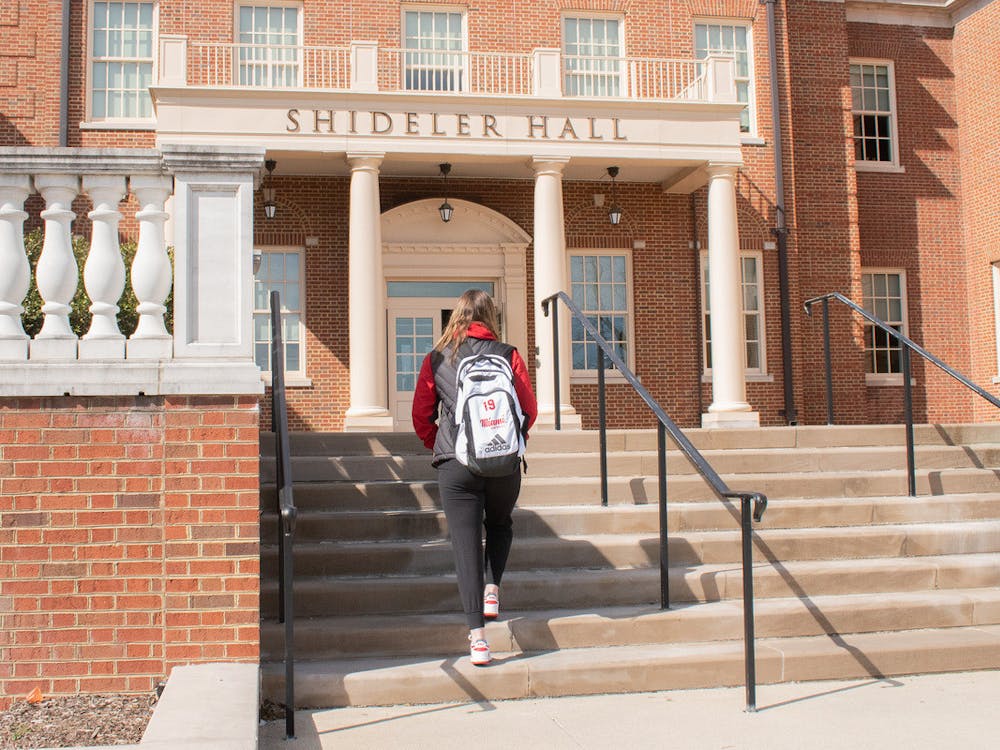UPDATE Tuesday 3/28 2:30 p.m.: The Student has learned that, as of yesterday, the office of Provost Phyllis Callahan has reversed an earlier decision regarding priority registration after reviewing student feedback. According to a release, students enrolled in the University Honors Program will retain early registration privileges, and Honors time tickets will soon be reversed.
As Miami students gear up to register for fall semester classes, they can expect a number of changes.
For one, the time in between class sessions is being increased from 10 to 15 minutes, a move university registrar Dave Sauter anticipates will be popular among students.
"Between classes, [you can] grab a cup of coffee, get to your dorm, walk to your car," Sauter said. "It will be a whole lot easier."
The earliest classes offered will still start at 8:30 a.m., with the next block of class meetings beginning at 10:05 a.m. instead of 10:00 to allow students more travel time. Sauter said that the current 10-minute interlude was implemented in the fall of 2013, when Miami began offering a winter term. At that time, class meeting times needed to be made longer as a way of compensating for the shorter semesters.
Priority registration is also being rolled back for this fall, with early registration privileges only being granted to disabled students and veterans -- who are required by law to be granted early registration -- and student-athletes, whose travel schedules often limit classroom time. In the past, Sauter said, he's also offered priority registration to nursing students who serve clinicals and other students who have internships.
"We look for those groups that have a legitimate narrowing of their schedule choices," Sauter said. "We're trying to get rid of some of these things that have no real value, that have existed for a while that maybe shouldn't exist."
As part of these changes, members of the University Honors Program will be allowed to register in BannerWeb 10 minutes prior to the time ticket for their class (first-year, sophomore, junior or senior, as determined by number of credit hours earned). Previously, all honors students were able to register several days prior to the opening of university-wide scheduling. A first-year honors student was able to register before a senior not in the Honors Program, a convention Sauter found impractical.
"Early registration [for this fall] is going to be narrower than it is now, and I would say appropriately narrower." Sauter said. "It's gone a little wild, a little crazy. 3,500 students [in a student body of approximately 17,000] doesn't sound like 'priority' anymore."
The last major registration-related change being enacted for this fall is the introduction of a university-wide process for course waitlists, eliminating the need for individual departments to establish their own protocol for students waiting to get into popular classes. The new system will eliminate all existing "force-add" and departmental waitlisting processes.
"If it's a class of 20 and you're the 21st student [to register], you will go on a waitlist. No more force-adds, no more handing around a piece of paper [and] finding the faculty," Sauter said.
Kim Ernsting, director of Miami's Student Success Center, said the existing system has long been a source of frustration for students and administrators alike.
Enjoy what you're reading?
Signup for our newsletter
"I think what's challenging with the force-add process is that there's not one standard way that it's done across campus. Different departments or different divisions would have a procedure that's not the same," Ernsting said. "Our hope in the Student Success Center is to begin to identify some of these navigational issues that students run into and asking the question about, 'Is there anything that we can do to make it better?'"
The answer that Ernsting and Sauter settled on came by way of the Farmer School of Business, which uses a proprietary online system to offer students seats in closed business courses during the fall and spring semesters. That system is available to students twice for each semester, once during the initial registration period and again prior to the start of the semester.
Marti Kyger, Assistant Dean for Enrollment Management & Director of Divisional Advising in FSB, said the software allows FSB officials to use students' DARS to determine who is offered a spot in a class.
"We pull critical information from the degree audit such as the student's major, minor, thematic sequence, how many earned hours he has, what he's already registered for," Kyger said. "We have a few questions that we ask with regards to prioritizing requests, why it's critical that [the student] get the course at this time, etc."
And while the university's model won't be a carbon copy of FSB's, Sauter says it will operate in a similar manner.
"In a political science class, the chief departmental advisor will say, 'OK, I've got a class of 20. I now have a few openings. I have eight students on the waitlist. Who should be in the class? Not the incoming freshman, non-political science major. We want to get the junior who needs the class.'"
Currently, there are several hundred courses piloting this new system, which allows students to add themselves to a course's waitlist via BannerWeb. At the time they are added to the list, students are able to enter information about why they would like to be considered for a seat in a particular class given their class standing or course schedule. They can also select whether they'd like to be considered for all sections of that course or just a specific one -- all features found in FSB's model.
Kyger said that enforcing a university-wide waitlisting protocol will have multiple benefits.
"I do feel we are able to handle many more requests this way. I also feel we can make our best decisions this way, because we can prioritize the requests appropriately and then if we can't offer a seat to a student, we can either provide some advice or some other opportunities or, at minimum, explain why the student can't be seated at this time."
And, Ernsting added, the waitlist procedure will give department administrators a means of benchmarking course popularity.
"It helps [departments] get some insight into the kind of demands there might be or interest in taking particular courses, so they can consider how many sections of a course they might offer in the next term," Ernsting said.
The waitlisting and priority registration changes are just two of the revisions being planned long-term. Sauter and Ernsting have drawn inspiration from a best-practices list compiled by third-party consulting firm Educational Advisory Board (EAB), and plan to roll out more changes in fall of 2018. Among those are are a revamped DARS interface, a scheduling wizard that will generate potential schedules for students based on the courses they need to take and the ability for students to register for a full year of classes at once.
Eventually, all students may be required to fill out a four-year "road map", or academic plan, plotting their schedule semester by semester.
"Having the option to create a road map for your four years, for your journey here at Miami, I think, gives students a chance to think about what they really want to learn and to think about the holistic picture of how to make the most of their time at Miami," Ernsting said.
Sauter said the road map could be used as a way to provide targeted guidance to students perceived as being "at-risk" -- for instance, an international student who struggles with English or a student who plans to double-major.
"It could be, if you're more of an at-risk student, we say, 'Once you do your road map, you need to see your advisor every time you make changes or every time you're going to drop classes because we want you to succeed,'" Sauter said. "We don't want to call students out, but we want to be able to say, 'Something's not going right academically for you.'"
Ultimately, Sauter and Ernsting said, the goal of these initiatives is to instill a greater sense of intentionality in the student scheduling process, thereby increasing retention and four-year graduation rates.




